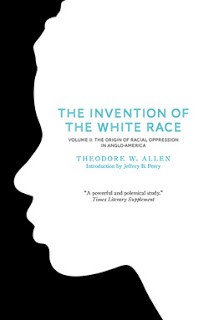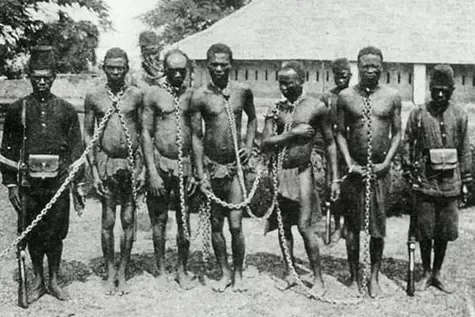By Richard Mellor in California
As a result of writing this post, I recalled that when I was young there was a TV show called The Black and White Minstrel Show. It was not my sort of music at all and it just was there; we never had a lot of TV time anyway back then.
I just assumed the older people watched it and they did. It was all these guys dressed in blackface and the women were not. I never thought about it as far as I can remember. So I looked up the Black and White Minstrel Show and I urge the reader please to follow this link and read a BBC piece about it and watch the two short videos.
What stands out in this video above about Jim Crow, and what should make us think about where racism originates, is the laws that a ruling class uses to keep people from mixing. It is not a natural thing for Protestants and Catholics for example, to live separately, or hate each other any more than people of different skin tones to do that.
Whites and blacks ran away together
In the plantations of the Caribbean, whites and blacks would frequently run away together, the same in the colonial US. So the plantation bourgeoisie in the Caribbean introduced laws like the one that made a white bond labourer responsible for the black one if they ran away together, which was common. The purpose for that law is obvious.
The English, then British ruling class, used religion to divide people, not just in Ireland but also in India. There is no colonial power or any group whose existence and wealth is gained at the expense of a majority on whose backs that wealth is created, that does not seek to divide the exploited in some way. Otherwise, the exploited, simply as a result of their common condition, would naturally unite in an attempt to get the monkey off their backs.
We are human beings and naturally recognize this, and when we exist in the same brutal, exploitative conditions, we tend to bond together on that basis. It is those who profit from these conditions that introduce divisive measures.
The Shaping of Black America
Lerone Bennett Jr pointed out in his book, The Shaping of Black America, how “…it proved very difficult indeed to teach white people to worship their skin.” and that, “…laws were also passed to leave a mark on whites, who were instructed under pain of punishment, how to act in relation to blacks. Under these laws, whites of all classes were penalized for expressing human impulses. It therefor became very expensive for a white person to like black people or to love them. This was not, it should be emphasized, a matter of hints and vague threats. The laws were quite explicit. Symptomatic of this were the laws passed to punish whites who befriended blacks or ran away with them.”

As I have written many times, Theodore Allen’s book, The Invention of the White Race, has also shown without a doubt that it was a conscious, though difficult, task dividing the poor who were brought to the early America and it was not a natural development.
Early Virginia records
He writes that the plantation capitalists introduced numerous acts “…to deny equal rights to African Americans. The evidence, however, clearly indicates that this purpose of the ruling class did not represent the desire or attitude of the European-American bond-labourers as a whole, or indeed of the common run of European-Americans in general.”
Allen adds that his extensive research into the Virginia records of the time found that cases of European-American support for anti-Negro laws to be “extremely few”, compared to the instances of class solidarity between black and white and the “readiness of free labouring class of European-Americans to make common cause with African-American fugitives from bond labour.”
Blacks and Whites made common cause
Allen even reveals the percentage of cases of fornication or intimate relations between African-American men and European-American women being far greater than the percentage of African-Americans in the bond labour force and this “mating of European Americans with African Americans as a serious problem” for the plantation capitalists, but is confirmation of both blacks and whites to “make common cause” in many aspects of their daily lives.

It is this important aspect of the origins of racial division and chattel slavery in early colonial America that is obscured, and the favoured method of accomplishing this being the almost non-existence of the class question and instead lumping all whites in one basket and today’s obsession with reactionary and harmful identity politics.
Not a personal, but a social problem
As I wrote in an earlier commentary, racism does not begin in the home, it begins in society. But while many people understand that racism and other so-called ‘personal’ problems are not personal but social and are not accidents but conscious strategies with a conscious aim, this view becomes clouded by the idea that it’s a personal problem. Once we understand fully its origins, then we can begin to understand how to combat it.
Malcolm X gave us a very important piece of advice when he said that “you can’t have capitalism without racism.” He is quoted and referenced millions of times, such is his social influence and popularity. But you will almost never hear or see in the writings of white liberals, black nationalists or the black petite-bourgeois in or out of academia, this powerful statement, and especially support for it because they don’t agree with Malcolm X on this. All of them in one way or another believe that racism can be eliminated under capitalism, that is the best of them, and others simply seek to advance their own class interests in the capitalist pecking order.
They are dangerous words, but not for the working class. It is why his nationalist views, which he came to question, are prominent; they don’t want Black, and especially White workers reading stuff like that.
From the US socialist website, Facts for Working People. The original can be found here.



